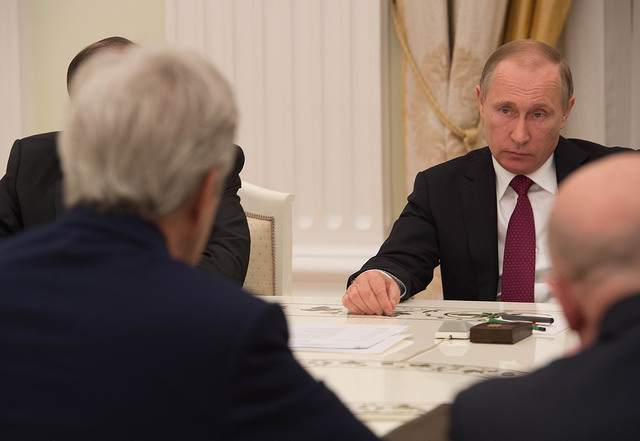Making Russia Great Again

Vladimir Putin has once again acted to subvert NATO when he met with Turkish president Erdogan under the guise of reconciliation after the Turks shot down a Russian Aircraft last November. His real intention however was clear, to increase relations with the easternmost member of NATO, a regime that grows more tyrannical and Putinesque daily. This is only the most recent in a string of actions designed to restore Russia’s Soviet-era level of world influence and to test the resolve of the United States and NATO, a test that we repeatedly fail.
Putin used the annexation the formerly Russian and strongly pro-Russian Crimean Peninsula to preview the responsiveness of a NATO that hadn’t been focused on Russia in over 20 years. The total lack of international response told him that the west was pusillanimous, giving him a green light for further aggressive behavior. He quickly followed this first act of belligerence by increasing Russia’s military presence in eastern Ukraine. Though Putin repeatedly denied these allegations, it is widely accepted that
Russian special forces were acting on the side of the rebels in Ukraine to create further instability in its eastern provinces bordering Russia. This action was once again met with no response from the United States or NATO. Our tendency to ignore this expansionary policy benefits Putin at the expense of western democracy as a whole, and it seems like a trend that will persist for at least the next four years.
The presidential candidates seem no more willing to stand up to Putin than the current administration has. While Mrs. Clinton was naïve enough to believe that over half a century of constant tension could be resolved with the pressing of a plastic button, the likes of which could be found on the shelves of Staples, Mr. Trump questions our commitment to NATO and to our allies in eastern Europe. The uncertainty currently being created by both candidates about the future of NATO has made the conditions prefect for Putin to make his next move.
Putin has already set himself up for a retaliatory attack against the Ukraine when he accused the former Soviet Republic of attempting to sabotage a Crimean highway earlier this week, killing Russian security personnel in the process. Given Ukraine’s comparatively weak military, poor organization, and preoccupation with rebel groups in eastern Ukraine this allegation is, as Ukrainian President Petro Poroshenko put it, “[a] fantasy that serves as a pretext for the latest round of military threats against the Ukraine.” (If you remember your history, you will recall that Hitler didn’t just invade Poland. He made claims of a Polish assault on a German border town, and called his invasion retaliation.) Russia, in response to this “Ukrainian attack” has begun to mobilize troops in Crimea and has scheduled training exercises for two of its new missile boats based in the Black Sea, BBC reports. In attempt to defend itself from what it rightly perceives to be a threat to its sovereignty, the Ukrainian military has deployed additional “combat ready” troops to the border with Crimea and to its eastern provinces. Placing two military forces in close proximity invariably leads to trouble.
It would not be unreasonable to interpret the events of this week as an attempt to provoke Ukrainian hostility, giving Mr. Putin a justifiable reason to take further action in Ukraine’s unstable eastern provinces. He might use this as an opportunity to create a buffer-zone between Russia and the West just as the Soviets did with their satellite countries. If such events transpire it will be on our consciences. He will have done this secure in the knowledge that the United States and NATO will not act against him, that our president and candidates for president were weak and willing to appease tyranny for a quiet life at home. This appeasement coupled with his new found friendship with Mr. Erdogan and his recent displays of totalitarianism would be tantamount to surrendering democracy’s eastern frontier and would undermine the strength of NATO, the United States, and democracy itself.
Our response must therefore be severe. We must project power and have it be seen by Putin as a sign that his actions are unacceptable. NATO troops should be moved into Turkey to ensure the borders of the west are secure and to ensure that no Russo-Turkish alliance can materialize. The United States should offer its fullest support to Ukraine as well as deploying additional aircraft and ground forces to eastern Europe as a deterrent against further belligerence. Putin is not a stupid man, he would never make a direct challenge against the United States, and so any show of support or pledge of military backing would bring a swift end to such pugnaciousness. If recent history has taught us anything it is that appeasement is the surest path to war and that our strength is what kept the Cold War from heating up. The Soviet Union may have been defeated in 1991, but the threat of Russia is just as real and just as dangerous to democracy. Our leaders and perspective leaders must realize this threat and act swiftly, with resolve befitting of a nation dedicated to the defense of Liberty. The war against the Soviet Union has ended, but the war to preserve liberty and democracy continues, and we are losing.
Follow me on Twitter: @FrankJConnor
Image Source: US State Department Flickr
License: Public Domain

